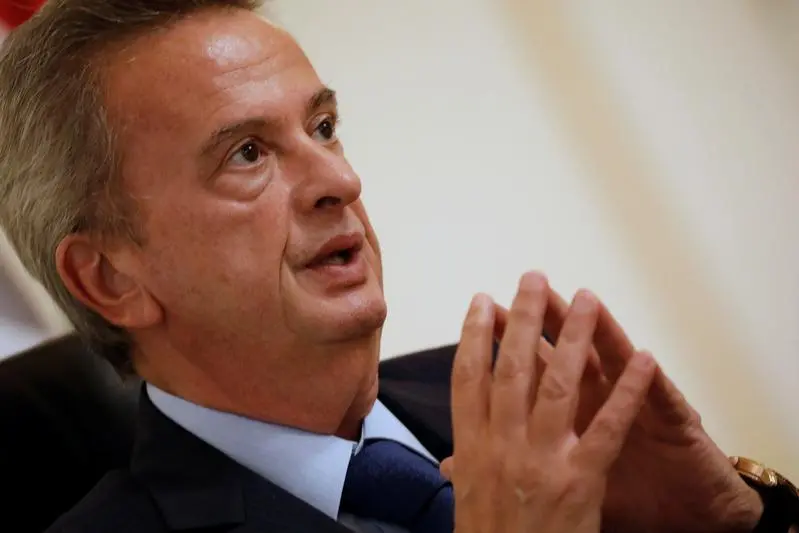PHOTO
BEIRUT: Lebanons GDP growth has fallen to zero percent so far this year, but the prospects of an improved economic performance for the end of 2019 is still on the horizon, Central Bank Gov. Riad Salameh said Tuesday.
He also announced that the Central Bank would work with the Finance Ministry on a mechanism to help the Treasury reduce debt servicing by $700 million.
Salameh also made assurances that Banque du Liban had no intention to tap international markets for new Eurobonds because the liquidity in the market was available.
Despite the fact that we have had this year zero percent GDP growth till now, we think at the horizon the prospects will be better for the Lebanese economy, Salameh told participants at the opening of the Euromoney Lebanon Conference at the Four Seasons Hotel.
It was the first official admission that the Lebanese economy has reeled under the severe economic slowdown, political paralysis and the constant delays in approving the 2019 draft budget.
One economist told The Daily Star that this was probably the first time so far this year that Lebanon had seen its gross domestic product growth shrink to zero percent, but added that there was still a chance of achieving modest growth at the end of 2019.
Lebanons GDP recorded 0.4 percent growth in 2018 and 0.6 percent in 2017.
Asked if the Central Bank would be willing to buy the LL11 trillion (around $7.3 billion) in Treasury bills at zero percent, Salameh said he was trying to find a mechanism with the Finance Ministry to help authorities reduce the cost of debt servicing by $700 million.
The governor said he did not expect Lebanese commercial banks to buy T-bills with zero percent interest at this stage, noting that the lenders had already been penalized by the governments decision to increase tax on interest on deposits from 7 percent to 10 percent.
One banker said that lenders were not yet willing to buy these bonds with such low interest rates.
BDL will probably subscribe to the entire LL11 trillion in T-bills and then try to sell part of them to the lenders. But I dont think the banks have any appetite to buy these bonds, the banker said.
Salameh said BDL would be in close contact with the Finance Ministry to review a mechanism to achieve the Treasurys goal of reducing debt servicing as discussed by the Cabinet.
The purpose of this mechanism is to preserve the price of these bonds as well as preserve stability in the market, he said.
This mechanism will be purely between BDL and the Finance Ministry and no one will impose anything on the commercial banks. But all that I ask is to be patient in order to find a solution for this issue, Salameh said.
Asked if the commercial banks would be willing to subscribe to T-bills at zero percent as they did at Paris II donor conference in 2002, the governor emphasized that he would not ask anything from the banks. They [banks] can voluntary do whatever they want but there will be nothing imposed on the banks. The banks have already been penalized by the new tax, which is going to cost them a lot of money. We also have to think about the solvency of the equity of the banks because this is important for the economy.He said the banks needed strong equity because it was good credit for the Lebanese economy.
Salameh added that the deposit base declined by some $3 billion, while outstanding loan portfolios declined by around $6 billion. This deleveraging is due to higher interest rates and less liquidity in the market, he said.
But the governor was upbeat at the prospect of drawing more funds to Lebanon thanks to the attractive interest rates on offer.
Looking forward, we have a situation where all the central banks in the world are announcing a decrease in interest rates. The U.S. Federal Reserve is expected to lower interest rates this year between 50 basis points to 1 percentage [point] and this applies to the 10-year Treasury bonds [in the U.S.]. The ECB [European Central Bank] has declared that there wont be any increase in interest rates. This will allow all the emerging markets, including Lebanon, to attract funds thanks to the higher interest rates offered in these markets, Salameh said.
The governor expressed belief that this would boost liquidity in Lebanon.
The Lebanese government has put forward a road map, which BDL considers as a constructive element for the future of Lebanon, he added.
The governor pinned high hopes on the governments plan to restructure the electricity sector. Doing so would allow the authorities to save $2 billion in three years. Salameh indicated that the budget deficit in the first four months of this year had increased by $1 billion.
He also expressed hope that gas exploration, which is set to begin next January, would also send a positive signal to the market.
Copyright 2019, The Daily Star. All rights reserved. Provided by SyndiGate Media Inc. (Syndigate.info).





















